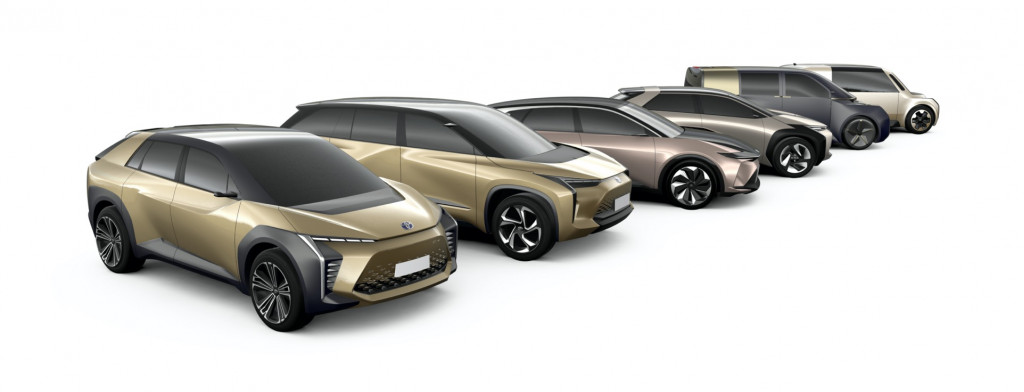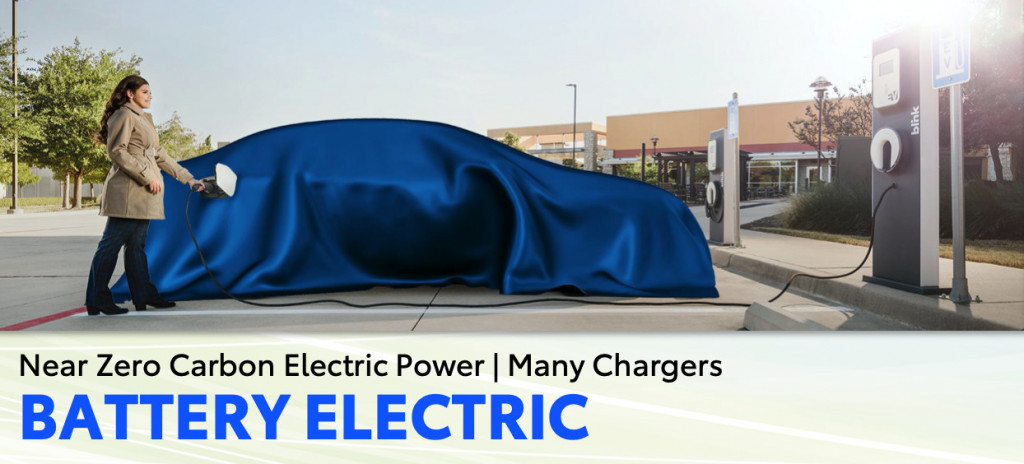2022 Toyota electric sedan and crossover: What we know about upcoming EVs, platform
Toyota on Wednesday revealed that two new electric vehicles will be arriving for sale in the U.S. in 2021.
Yes, that’s this year. While it may come as a bit of a surprise, it’s something Toyota has outlined before. It’s just not a message that its U.S. organization has been boosting.
In July 2019, Toyota in Japan announced that it will “efficiently develop various types of BEVs” for China, the United States, and Europe.

Concepts preview battery-electric cars being developed at Toyota
At that time it sketched out six vehicles in all, including the development of a “Medium SUV” about the size of the RAV4 with Subaru, and a compact car with Daihatsu. The plan for e-TNGA—to be developed together with Subaru—allows for front-, rear-, or four-wheel drive, and three different battery capacities, as well as three wheelbases and short or long front and rear overhangs permitting a wide range of vehicle styles.

Toyota e-TNGA propulsion layouts
A presentation accompanying the Wednesday announcement demonstrated that Toyota plans to focus on multiple modes of electrification, of which battery-electrics are one. A slide emphasized this diversity with four models, showing off hybrid, plug-in hybrid, battery electric, and hydrogen fuel-cell technologies, respectively.

Toyota U.S. electrified vehicles presentation – February 2021
The RAV4-sized model is expected to be one of those soon-arriving EVs. As for the other, the profile teased under the car cover appears to be a strong hint. It’s a sedan that appears to have a roofline not shared with current models such as the Corolla, Camry, or Avalon. It also doesn’t bear much if any likeness to the Prius, and it has completely different proportions than those of the the Mirai fuel-cell sedan.
Toyota didn’t hesitate to reconceive the Mirai fuel-cell sedan. Does this signal the long-awaited reboot of the Prius? Or is this an all-new efficiency nameplate for the brand?

Toyota future electric vehicle designs – 2019
But there’s been some mixed messaging. Despite Toyota’s nudge for a global rollout of those vehicles, Toyota North America told a different story, saying that its dealerships were confirming that Americans weren’t asking for EVs and none were in the works for the near future. Both several months before and several months after the global reveal, CEO Jack Hollis confirmed that there was essentially “no demand” for EVs in the U.S.
Just 15 months later, if the announcement of two EVs is any indication, Toyota’s attitude toward EVs might be very different. Or the company’s EV policy might be different in the reality of a new U.S. administration.
Toyota noted the first two generations of the RAV4 EV and provided the following statement to Green Car Reports: “While battery electric vehicles (BEVs) today represent approximately 2% of the overall new car market, Toyota sees growing customer demand in the years to come. To meet that demand, Toyota will bring a third and fourth BEV to the market next year as well as continue to offer a full spectrum of alternative fuel vehicles, from fuel cell vehicles to plug-ins to hybrids.”

What is this Toyota electric car?
Toyota noted that with the average U.S. commute of about 32 miles round trip, commuting in a 300-mile BEV can be wasteful as it introduces extra battery mass and involves extra greenhouse gas emissions due to the mining and transportation of materials and the manufacture of the battery. Thus, it says it’s aiming for better battery utilization in offering a range of plug-in hybrids and EVs.
In 2019, Toyota underscored the importance of battery durability, and having packs that didn’t degrade significantly in usable driving range over time. Some of the batteries for EVs are expected to come from the joint-venture company that Toyota established with Panasonic, called Prime Planet Energy & Solutions, Inc., which is supplying packs for the RAV4 Prime.

Toyota-Subaru electric vehicle platform
Meanwhile, Toyota is reportedly working on a prototype using faster-charging solid-state battery technology that company officials have said could be deployed by the middle of the decade. If Toyota can show the focus on EVs that it’s had on hybrids, the companies that embraced EVs long ago might face some tough competition yet.

